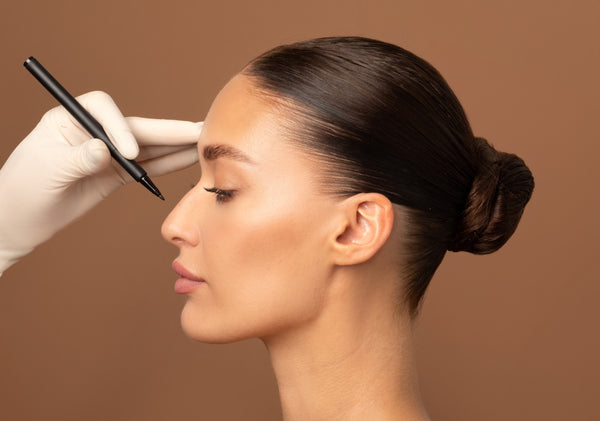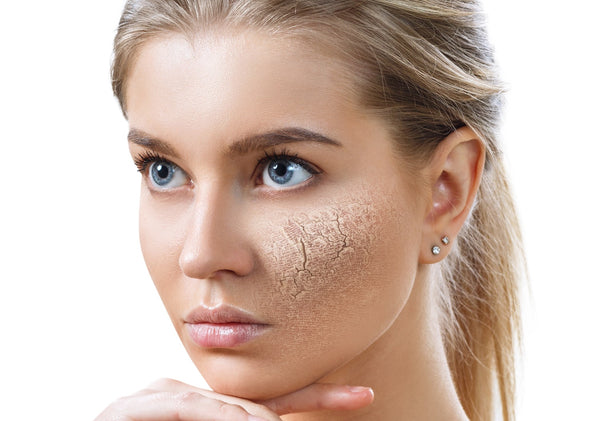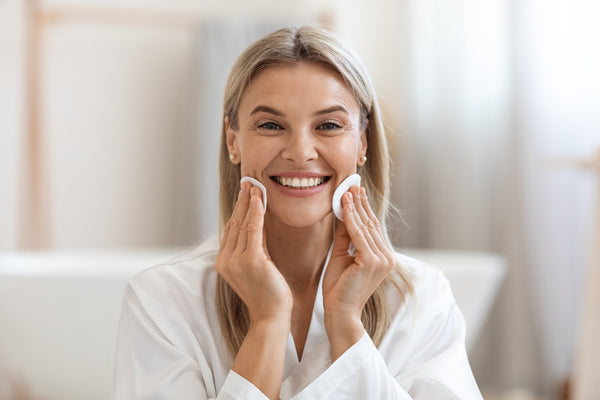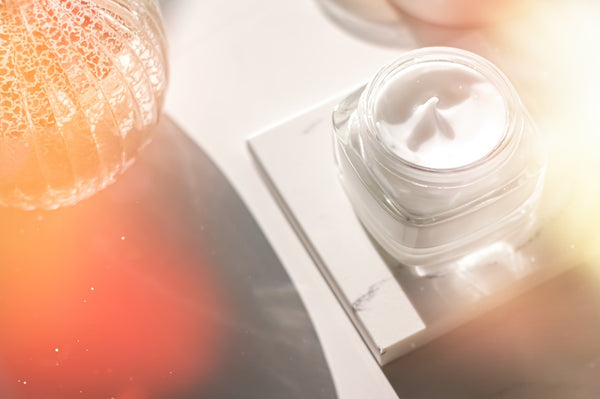What to Know About Skin Changes During Your Monthly Cycle

Cramps, excessive sugary cravings, and throbbing headaches are not the only cyclical hormonal changes that you come across during your monthly cycle. Skin changes and breakouts have officially entered the chat!
But don't worry, breakouts and skin changes during ovulation or other vital phases in your cycle are completely normal. Interesting, right? Read on to learn more about the causes, and what you can do to help minimize breakouts and uncomfortable skin changes during your monthly cycle.
How do hormones impact your skin?
Your hormones play a major role in your skin’s health. There isn’t a day that goes by without some fluctuation of your hormones, helping to preserve your body’s normal physiological function. The question is: what hormones are responsible for your skin’s monthly breakout?
The answer lies in three hormones that you may already be familiar with: estrogen, testosterone, and progesterone.
Estrogen
Looking forward to that ethereal glow that you get around the beginning of your cycle? You can thank estrogen–the hormone responsible for giving you that bright, radiant, and supple look to your skin. Estrogen rises in the first half of your cycle, encouraging the production of elastin & collagen, which gives your skin an instant facelift effect.
Testosterone
Testosterone is one of the only hormones that keep a steady baseline throughout your cycle, helping you to ride the waves of the intense estrogen & progesterone dips. Testosterone is the hormone that’s associated with oil production, though, so during those dips, you can expect to have a higher chance of seeing sebaceous or hormonal acne flares.
Progesterone
The final hormone that can impact your skin is progesterone: which, in high doses, can lead to inflammation and excessive oil production on the surface of your skin. Progesterone rises during the PMS phase of your cycle, and dips at the start of menstruation, giving you the perfect reason to treat yourself to a little extra self-care.
Exploring your hormonal cycle: Skin care help with hormonal changes
The menstrual cycle can get confusing, especially because everyone’s skin reacts differently to hormonal changes and shifts. Below, we’ve summarized exactly what goes on at different points or phases of your cycle–but keep in mind that cycle lengths can range between 28-40+ days. If you’re concerned about cyclical skin issues or managing symptoms of your cycle, we encourage you to seek medical care from your provider.
Cycle: Days 1-7

The start of your cycle is marked by the first day of your period. As you might expect, you’ll likely feel irritable, inflamed, bloated, and uncomfortable. Your skin may also show signs of this via hormonal acne flares, redness, and tenderness. At this point in the cycle, both estrogen and progesterone are low–leading to higher levels of sebum production and duller skin appearance.
Here’s how to fix it: Try a deep moisturizing serum and skip the exfoliants for now. Your skin is extra sensitive, and won’t likely appreciate the rougher skin treatments. Build in time for some masking as well, or use a high-quality hyaluronic acid treatment. These types of gentle, supportive products are important to protect and revitalize your natural barrier.
Cycle: Days 8-10
Here’s how to fix it: Consider using a gentle, non-drying astringent to address those trouble spots, and be sure to exfoliate and cleanse regularly. Double cleansing or excessive use of exfoliants can lead to drying and rupture of your natural skin barrier, so try to limit those more in-depth skin treatments to 1-2 times per week.
Cycle: Days 11-17
After a few days of rising estrogen, you’re at your peak level of natural radiance. You’re about to ovulate, so your body pulls out all the stops to get you glowing. Now that your estrogen has evened out, you can expect a little extra moisture in your skin without the oil overload, leading to fewer breakouts and higher levels of confidence and shine. You can always be working ahead on your skin, though! Want to avoid breaking out during ovulation?
Here’s how to fix it: Use this time to support your skin’s natural glow. Supplementing with some deep hydrating tools, like retinol & Vitamin C treatments, can help to prepare your skin for the dip coming up during pre-menstruation. At this stage, your skin’s natural moisturization should keep excessive dryness at bay, meaning that exfoliation shouldn’t lead to breakouts or itchiness.
Cycle: Days 18-28
 Now that ovulation is over, you’re dealing with the not-so-fun side effects of PMS…and the skin effects that come with it. Your skin may be more inflamed, irritated, dry, and acne-prone due to the excessive oil production caused by the drop in estrogen and upcoming drop in progesterone right before your period.
Now that ovulation is over, you’re dealing with the not-so-fun side effects of PMS…and the skin effects that come with it. Your skin may be more inflamed, irritated, dry, and acne-prone due to the excessive oil production caused by the drop in estrogen and upcoming drop in progesterone right before your period.
Here’s how to fix it: Resist the urge to excessively masking or tone your skin, even if you’re having breakouts. This can lead to further drying of the skin, which can lead to even more oil production. You’ll want to gently tone with an alcohol-free toner of choice to minimize acne-causing bacterial buildup on the skin’s surface, and refresh your skin with additional moisturization support. Reach for your go-to products, such as your favorite hydrating mask, serum, or treatment. New products that could potentially cause skin reactions to having a higher chance of doing so, as your skin is at one of its most sensitive points in your hormonal cycle. Exfoliation is a no-go here, too, as this can make your breakouts and irritation worse.
How to support hormonal acne naturally
If you’re looking for other ways to support your hormonal acne naturally, we recommend managing your diet, investing in a trusted dermatologist, and solidifying your skincare routine with MD Glam.
Here are just a few of the ways these steps can help you to take control of your skin’s health and wellness:
Managing your diet: Your diet plays a large role in your skin’s health. Reducing the intake of processed foods, and focusing on anti-inflammatory diet additions can help manage acne, redness, and inflammation. These foods are naturally more nutritious and energizing–so you’ll also feel better, too! If you’re looking for a place to start, consider
- trying more whole foods, including berries, nuts & seeds, avocado, cruciferous veggies, and lean meats.
- Finding a derm: Investing in a dermatologist can help you to feel confident in your skin’s health. You can enjoy personalized recommendations that can help you to address skin needs, and enhance your skin’s natural glow. They can also work with your other health professionals to help you reach your highest level of total body health.
- Solidifying your skincare routine: If you’re notoriously bad at forming habits, your skincare routine should be the first place to start. Solidifying your skincare routine now can have a great payoff, and can lead to more comfortable, healthful, and confident experiences at every point in your cycle.
Manage breaking out during ovulation with strategic skincare
It is possible to have youthful, healthful, and radiant skin at every point in your cycle–you just have to adopt strategic skincare practices that address the needs of your skin then.
Tell us what your go-to products are for shifts in your hormonal cycle.











